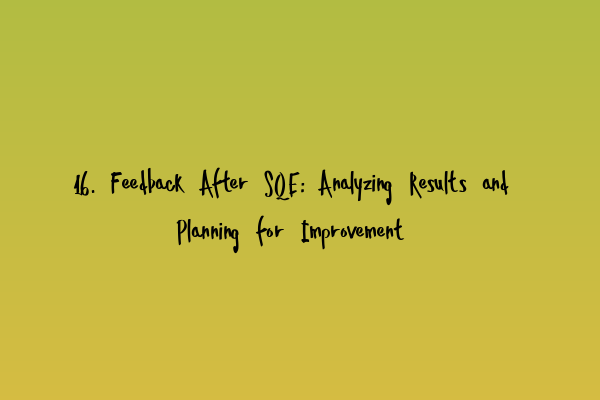16. Feedback After SQE: Analyzing Results and Planning for Improvement
As a solicitor, the journey towards qualifying and becoming fully licensed is a challenging one. The Solicitors Qualifying Examination (SQE) is a major milestone in this journey, designed to assess your competence and readiness to practice law. Once you have completed the SQE, it is essential to critically analyze your performance, gather feedback, and plan for improvement. In this article, we will explore the importance of feedback after the SQE, how to analyze your results, and strategies for planning your path forward.
The Value of Feedback
Feedback is a powerful tool that enables continuous growth and improvement. It provides valuable insights into your strengths and weaknesses, highlighting areas where you need to focus your efforts in order to excel. After completing the SQE, seeking feedback from various sources is crucial to understanding your performance and identifying areas for improvement.
One valuable source of feedback is the exam board itself. The SQE examiners carefully review and assess your performance, providing you with a detailed breakdown of your scores and performance in each section. Take the time to thoroughly examine this feedback, paying close attention to the areas where you scored lower. This will help you identify patterns and prioritize your study plan moving forward.
Another valuable source of feedback is your peers and colleagues who have also taken the SQE. Engage in discussions with them, share experiences, and learn from their insights. By comparing notes and discussing challenging areas of the exam, you can gain valuable perspectives and identify additional areas for improvement.
Furthermore, seeking guidance from experienced solicitors or mentors can provide you with a fresh perspective on your performance. They can offer valuable insights based on their own experiences and provide you with actionable advice to enhance your knowledge and skills.
Overall, feedback should be seen as an invaluable asset that enhances your learning and development. Embrace feedback as a constructive tool and use it to guide your journey towards becoming a proficient solicitor.
Analyzing Your Results
Once you have gathered feedback, it is crucial to take the time to analyze your results and understand the areas where improvement is needed. Here are some steps to help you make the most of your feedback:
- Identify patterns: Look for trends and patterns in your performance across different sections of the exam. Are there consistent areas where you struggled? Identifying these patterns will help you pinpoint your weaknesses.
- Set priorities: Prioritize the areas where you need improvement based on their impact on your overall performance. Focus on building a solid foundation in these areas before moving on to more advanced topics.
- Review study materials: Evaluate the study materials you used to prepare for the SQE. Are they comprehensive and aligned with the exam syllabus? Consider incorporating additional resources or seeking guidance from reputable SQE training providers.
- Create a study plan: Based on your analysis, develop a structured study plan tailored to your specific needs. Break down your study sessions into manageable chunks and allocate sufficient time to each topic. Regular review and practice will be key to reinforcing your knowledge.
By taking a systematic approach to analyzing your results, you can effectively identify the areas where improvement is needed and design a study plan that maximizes your chances of success.
Planning for Improvement
Planning for improvement requires a strategic approach to your studies and the implementation of proven tactics. Here are some strategies to help you plan your path forward:
- Strategies to tackle MCQs: Multiple-choice questions (MCQs) are a significant part of the SQE. Familiarize yourself with proven strategies to tackle MCQs effectively. Check out our article on Strategies to Tackle SQE MCQs: Mastering Multiple-Choice Questions for valuable insights.
- Master problem-solving: Scenario-based questions require critical thinking and problem-solving skills. Sharpen these skills by working through realistic scenarios. Gain further insights from our article on Scenario-Based Questions in SQE2: Become a Master Problem-Solver.
- Understand the exam pattern: Familiarize yourself with the SQE exam pattern to know what to expect. Our article on Demystifying the SQE Exam Pattern: Knowing What to Expect provides a comprehensive breakdown of the exam structure.
- Apply knowledge through case studies: SQE case studies test your ability to apply legal knowledge in real-life scenarios. Practice with case studies to refine your analytical and practical skills. Learn more from our article on SQE Case Studies: Applying Knowledge in Real-Life Scenarios.
By incorporating these strategies into your study plan, you can tackle the SQE with confidence and increase your chances of success.
In conclusion, feedback is a vital component of the post-SQE process. Embrace feedback as an opportunity for growth and improvement, and make the most of the insights provided by the examiners, peers, and mentors. Analyze your results thoroughly, identify areas for improvement, and create a study plan that is tailored to your needs. Finally, incorporate proven strategies and tactics into your plan to enhance your chances of success. Good luck on your journey towards becoming a qualified solicitor!
